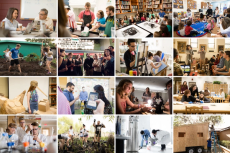Cool Class: Difficult Dialogues in Health Communication
Tough conversations are the most meaningful in this community engagement class that offers a lifetime of takeaways.
By Elsa Wenzel
February 23, 2021

Forget about small talk. In Difficult Dialogues in Health Communications, students learn how to set aside social taboos to address some of life’s most emotionally painful moments, including death, grief, and loss. They engage in difficult conversations with loved ones and with each other so they can develop effective tools for navigating the uncomfortable feelings that make us feel uncertain and out of control. They also put what they’re learning to work in the world by partnering with child-centered nonprofits, establishing meaningful connections through service.

Instructor
Sarah Parsloe (aka Puppet Parsloe), assistant professor of communication


The Scoop
This community engagement course (CE) is a powerful union of service learning and human connection that teaches skills in communication and social science research methods along with listening, validating, and empathizing. Through hands-on experiences like making puppets to communicate with grieving children, creating digital promotions for local nonprofit New Hope for Kids, and even writing their own end-of-life directives, students learn that people don’t understand their experiences until they shape the events of their lives into a plot.
“Offering people a scenario that reflects a personal experience gives them control,” says communication professor Sarah Parsloe, “turning them into a director rather than a character in their own narrative.”
Takeaways from this course apply equally to a student’s pursuit of a meaningful life and productive career, honing key skills in leadership, communication, and initiative that are determinants of both personal and professional success. Building a website, crafting a sock puppet, participating in a book club, and memorializing loved ones all serve to bolster students’ storytelling abilities to support not only themselves, but the relationships with family, friends, and their larger communities that characterize their lives.
“If my students can take anything away from this class, the core of it is how to open these difficult dialogues and how to navigate these difficult dialogues—to have the courage to do that,” says Parsloe. “And then to recognize that difficult dialogues are the ones most worth having.”



Snapshot
The class teamed up with local theater group Michelee Puppets to take part in a digital puppet-making workshop, where they learned to make puppets of their own and how their creations could serve as communication tools for grieving children. The activity provided a grounding, tactile experience for in-person and remote students alike.
Communication major Lauren Walier ’22, who was attending class virtually from Georgia last semester, received a craft kit in the mail and bonded over the activity with her 12-year-old sister.
“In terms of being a virtual student, we got as up close as you could get with this,” says the aspiring speech pathologist. “It was completely hands-on, and I loved it. It was so amazing to learn about what an impact these puppets have. This activity and the class as a whole really allowed me to grow in terms of how I look at difficult subject matter like death and dying and grief in a place of empathy, understanding, and learning.”
Walier and her fellow classmates went on to create a video for participants in Children’s Grief Awareness Day in which grownup therapist puppet Dr. Bert shows child puppet Lilly that it’s normal and natural to express feelings of confusion and sadness.


Student Perspective
“From the experience of making puppets to help struggling kids to asking my dad really difficult questions, this course has been life-changing,” says Walier, who also had the opportunity to memorialize her aunt who died tragically on 9/11. “It offers so much more than a test or an exam or a paper—it’s really about life skills.”
Big-picture concepts in communication and how they can be applied to so many different facets of life also resonated with Alana Goodwin ’22. “This course taught me a lot about the importance of connecting with others even if we can’t physically be together,” says the double major in psychology and health communication whose experiences and relationships at Rollins have inspired her to become a professor.

Fun Fact
This past November, students took over the Instagram account of New Hope for Kids—a nonprofit that helps children grieve and cope with a serious illness or the loss of a parent—ahead of its celebration of Children’s Grief Awareness Day. They live-streamed the socially distanced event held near campus to memorialize loved ones and engage grieving families in their own digital puppet-making workshops.
- Categories:
- Communication Studies |
- Cool Classes |
- Academics

Recent Stories
February 12, 2026
Fetscherin Wins Major Toy and Parenting Awards
Business professor Marc Fetscherin’s award-winning children’s book Bones Is Back: A Family Tradition for Halloween recently received two major honors.
February 12, 2026
Rollins History Students Present at Regional Conference
Ten Rollins history majors and minors presented their research at the Florida Conference of Historians in Gainesville, Florida, with topics ranging from the Vietnam War and eugenics to St. Wivina and gentrification in Orlando.
February 11, 2026
8 Ways to Celebrate Thaddeus & Polly Seymour Acts of Kindness Day
From donating food to helping build a home, find out how you can celebrate the legacy of Rollins 12th president, Thaddeus Seymour, and his wife, Polly, and spread kindness on February 17.

